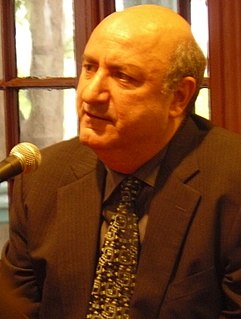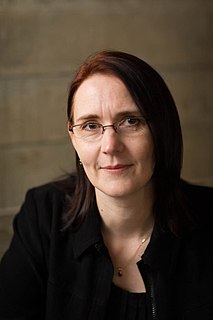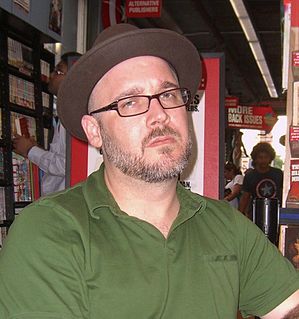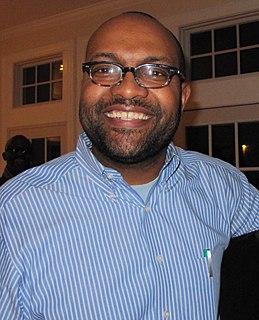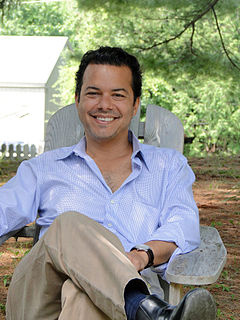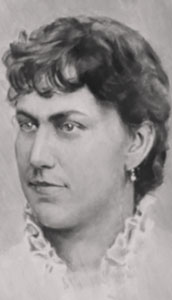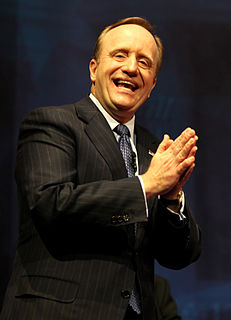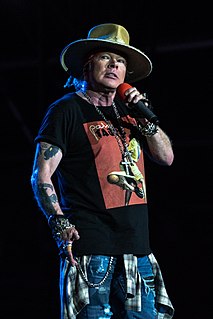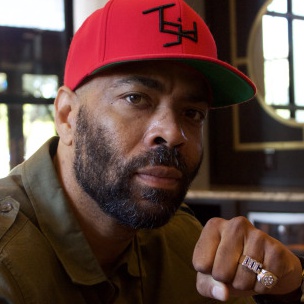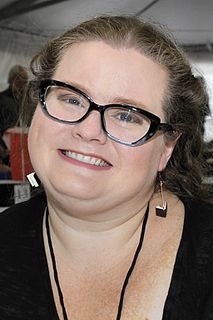Top 995 Desktop Publishing Quotes & Sayings - Page 16
Explore popular Desktop Publishing quotes.
Last updated on December 12, 2024.
When I started teaching, I would get miffed if a student asked me to write him or her a recommendation for law school - I'd feel like that's not what we were doing in the course. But now I see that person as someone who might be gainfully employed. I bring in a lot of people to speak to my classes, and I've gotten to the point where I've expanded the type of guests I invite to include people both inside and outside of the traditional publishing world.
I had two competing ambitions when I was a child: I wanted to be a Scientist and Discover Great Things, but I also wanted to be an Author and Write Great Things. I've always tried to combine the analytical with the creative, to some extent or another, because I find it hard to do one without the other. I've worked as a tech journalist, social media consultant, and now am self-publishing fiction.
We got the first WikiLeaks publication of documents hacked and stolen by Russian government sources from the DNC, from the Democratic Party, and they started publishing those stolen documents from the DNC right before the Democrats started their convention.Good political timing if you`re trying to help [Donald] Trump and hurt the Democrats.
I just keep my ear to the street. I haven't read any music books recently, because I figure I read everything I need to know back when I was 12, 13 years old. I know pretty much everything about record publishing, radio stations. The only thing that's changed is you gotta keep up with social media. It's free promotion.
With comics, you can only really learn what you're doing wrong or what works best when you see your work published. I've been publishing comics since my 20s, and still, when I flip through any of my new comics, I still only see the things that I wish I'd done better. But that's how you learn, by seeing it.
I begin early in the morning and edit everything I wrote the previous day. I write until mid-afternoon. My goal is to write a chapter per week, and if I am not finished by Friday, I write on the weekend. I get a lot of fan emails and answer them every day. In the late afternoon, I attend to the business of publishing, etc.
I think the celebrity author trend reflects, at least in part, the growing influence of marketing departments at publishing companies. The emphasis becomes on the easy sell, as opposed to finding the best quality and writing and illustrating. There are exceptions (I like John Lithgow's stuff, for example), but a lot of it is putrid, and the best of it is often ghostwritten. Save the ink. Save the trees. Save our brain cells.
While many of the established media make losses or go bankrupt, WikiLeaks has survived a major conflict with a superpower, including an unlawful economic blockade by its banks and credit card companies and the detention of its editor. We have no debts. We have not had to fire staff. We have never lost a court case related to our publishing. We have never been forced to censor. Adversity has hardened us.
Undercover investigations threw back the curtain on the systemic exploitation of animals on factory farms. The response by agribusiness interests has been to back laws that ban animal advocates from taking pictures or videos at these facilities, and ban the media from publishing any that are taken. The laws also make it a crime for animal advocates to seek employment at animal enterprises without disclosing their intentions.
The current publishing scene is extremely good for the big, popular books. They sell them brilliantly, market them and all that. It is not good for the little books. And really valuable books have been allowed to go out of print. In the old days, the publishers knew that these difficult books, the books that appeal only to a minority, were very productive in the long run. Because they're probably the books that will be read in the next generation.
You can never read your own book with the innocent anticipation that comes with that first delicious page of a new book, because you wrote the thing. You've been backstage. You've seen how the rabbits were smuggled into the hat. Therefore ask a reading friend or two to look at it before you give it to anyone in the publishing business. This friend should not be someone with whom you have a romantic relationship, unless you want to break up.
It's like the query letter problem that I just mentioned, magnified a hundredfold. You might be good at telling a story, but that doesn't mean you know anything about marketing. Or layout. Or editing. Or publicity. Or selling your books for foreign markets.Everyone can point to a few examples of people that have done very well for themselves self-publishing. But honestly, those folks are lucky as lottery winners.
I love the good old book with glue and binding, I really do, but that is just one way of experiencing text, and suddenly we have so many new ways, including our laptops, our phones, our watches. People in my generation agonize over this. People much younger than me don't agonize at all. They just go ahead and find ways to transform publishing.
I've been getting publishing royalties and stuff like that. I have just been lucky. They come in at the right time. Sometimes they don't, but I am not wealthy or anything like that. I just love to work. I would rather work three hundred and something days out of the year. I would rather be working. They don't know. I love playing. Then I can really get my music together.
I remember that the single most vicious letter I ever read was the letter Hemingway wrote Scribners when they asked him to give a blurb for From Here to Eternity. It's there, in the Selected Letters for all to read, an example of a once great writer at his very worst. I doubt that he ever forgave Scribners for publishing James Jones in the first place. War, as Hemingway saw it, belonged to him.
I'd written my first novel for adults, which was called Basic Eight and was set in a high school, and we were having a devil of a time selling it. It ended up in the hands of an editor of a children's publishing house, for which it was entirely inappropriate. She said, "Well, we can't publish this, but I think you should write something for children," which I thought was a really terrible idea.
I think it's significantly easier to be a female writer today than in the early 1800's. That said, it's hard to imagine almost anyone who knows anything about publishing disagreeing with the statement that women writers today are often taken much less seriously than men writers. But it's hard to quantify, and even define, what being taken seriously means.
You know how some people are upwardly mobile? I'm sort of downwardly mobile in the publishing world, because of my sales figures and also because of the kind of books I write. Everything really counts on sales. I started out with a bigger press, my first few books. But I've always done some things with independent and small presses and small magazines and I always will.
Even if 80 percent of the population of a country are Christian believers, they will have almost no cultural influence if the Christians do not live in cultural centers and work in culture-forging fields such as academia, publishing, media, entertainment, and the arts. The assumption that society will improve simply be more Christian believers being present is no longer valid.
We are interested in stifling the sale of this book. We believe that this can be best accomplished by refusing to be stampeded into giving it publicity...The less discussion there is concerning it the more sales resistance will be created. We therefore appeal to you to refrain from comment on this book...It is our conviction that a general compliance with this request will sound the warning to other publishing houses against engaging in this type of venture. (Signed) Richard E. Gutstadt, Director.
In publishing books and winning awards, it's like you've enjoyed this meal, you know, two months ago. How long can you be nourished by thinking about it? You've already ingested it, and you've excreted it, and that was two months ago. You had this fabulous meal. It's not going to keep you satiated today. You have to go out and get your next meal. For me, that's writing. I have to go out and hunt my next meal.
People have proven over and over that they will read if they are given something they like. The problem with reading is not reading, its that almost everything out there sucks. For so long, publishing has been run by a cartel of snobby pseudo-intellectual failed writers, and the resulting output has reflected not what the market wants, but what they think people are supposed to read.
In 2011, I did an internship in Seven Dials, a junction in London where seven roads come together. I'd given up on writing after multiple rejections for my first novel, and I was starting to consider a career in publishing instead, but Seven Dials gave me such a strong idea for a setting that I couldn't resist picking up my pen again.
It's so exciting when a book catches traction you didn't even expect (or completely did expect!), and so frustrating when a book never quite catches the traction you know it deserves. But either way it doesn't change the book, it doesn't change how much I love that book, or how thrilled I am to be publishing it.
Memoirs are going to be problematic sells for a while, though, because even if memoir means "based in memory," right now, in the collective mind, memoir means "recovery." When my agent and I started looking at small presses the possibility for my book, I realized most small presses were not publishing memoir, because they don't want to be associated with the genre that Mary Karr calls, half-facetiously, "literature's trashy cousin."
I sent a lot of publishing ideas to my publisher, about 30 of them. Each time except 3, i got a "rejection letter". This is basically what a rejection letter is like: Hello Pathetic Moron, We read your book. It sucked. Don't send us another one. If you do, we will run over your grandmother with a bus. Don't Do It. From, Your Publisher
The day has gone by when a monk can tear a Hypatia from the pursuit of philosophy and throw her to a rabble of insane monastics to be dragged to a violent death.... Man has made himself a law unto himself, publishing it in his pretended "heavenly" revelations, dogmas, and statutes. Woman is not constructing a law unto herself, and she is putting it forth, not on a pretendedly supernatural, but on a natural basis.
Whatever pictures are put into the world, the balance needs to be readdressed, it needs to be observed. That's why I am also really questioning what a lot of photography has done since I began. I am not saying because of me, but I mean, photographing some friends partying and publishing the pictures meant something else in '92 than it does in 2011. And I find the younger generation is not questioning this at all today.
Yoshihiro Togashi here. I'm back doing a weekly serial, and here I am publishing my first volume already. Thanks to all my readers for their support. I am entirely indebted to you. I took this picture (it is a photo of Togashi wearing a rabbit mask) at a certain party by the way, not a shady membership club. I'll work hard to crank out dozens of volumes. I promise not to complain. I won't run away. I won't lose it. I think. Maybe.
There's definitely some sort of dissent brewing between record labels, publishing companies and artists [about the compensation they get from streaming services] Spotify is returning a HUGE amount of money [to the record labels]. If we continue growing at our current rate in terms of subscriptions and downloads, we'll overtake iTunes in terms of contributions to the recorded music business in under two years.
The big question that scientists haven't even begun to get an answer for is how many species of microorganisms are there? Now, this is not stamp collecting. What we need is experts totally devoting their research to everything they can find out about every species, in a community of scientists who appreciate that every fact counts...everything new you learn about any species in any group is worth publishing somewhere.
North Carolina Senator Jesse Helms has signed a deal with Random House to write his memoirs. Scholars will no doubt benefit from the reflections of a man who was wrong on every major issue for 40 years. Helms' aides say the proceeds from the book will be donated to the non-profit Jesse Helms Center where they apparently have more experience burning than publishing them.
If I had followed my own rules - if I had eaten my own dog food - I would have created a digital book that is searchable and linkable, that can be corrected and updated and discussed and passed around. But I took my publisher's advance money. Hey, dog's gotta eat. The book publishing industry still works - for now - because it adds value with editing, promotion, sales, and cash.
Eragon started as me but ended up evolving into his very own character, .. Even as he has gone through his coming- of- age story, the process of writing and publishing these novels has been my own coming- of- age story. There are parallels between my own experience and Eragon's, but fortunately, I don't have people charging at me with swords.
What's different now is that while political leaders used to give talking points to talk radio, now talk-radio hosts are giving talking points to political leaders. It's all part of the suffocating spin cycle we're in. In media, politics and publishing, the conventional wisdom is to play to this base.
Literary science fiction is a very, very narrow band of the publishing business. I love science fiction in more of a pop-culture sense. And by the way, the line between science fiction and reality has blurred a lot in my life doing deep ocean expeditions and working on actual space projects and so on. So I tend to be more fascinated by the reality of the science-fiction world in which we live.
First one gets works of art, then criticism of them, then criticism of the criticism, and, finally, a book on The Literary Situation , a book which tells you all about writers, critics, publishing, paperbacked books, the tendencies of the (literary) time, what sells and how much, what writers wear and drink and want, what their wives wear and drink and want, and so on.
If someone asked me if I could have anything in the world, what would l want? If l could own anything, like owning a piece of art, l think it would be Elton John's publishing, on his first seven albums. I don't want the money. Being able to own those songs Is like owning a painting of someone you admire.
Even more than getting compliments on social media, what I love is when some random stranger says something very funny or insightful about my books, often in 140 characters or less! It's a very casual, low-stakes, non-burdensome way of connecting that I think is fun for both the writer and the reader. And there are a lot of clever people out there who have no connection to publishing.
I had written a book. For various reasons, the publishing industry had decided that my book was going to be 'important.' The novel had taken me 12-and-a-half years to write, and after being with the book for so long, I had no real perspective on the merits or demerits of what I had written. I hoped it was good, but feared that it wasn't.
New information and communications technologies can improve the quality of life for people with disabilities, but only if such technologies are designed from the beginning so that everyone can use them. Given the explosive growth in the use of the World Wide Web for publishing, electronic commerce, lifelong learning and the delivery of government services, it is vital that the Web be accessible to everyone.
Television in the 1960s & 70s had just as much dross and the programmes were a lot more tediously patronising than they are now. Memory truncates occasional gems into a glittering skein of brilliance. More television, more channels means more good television and, of course, more bad. The same equation applies to publishing, film and, I expect, sumo wrestling.
As somebody who's kind of a technophile, I'm interested in how traditional and digital publishing connect. Maybe ten years ago they were seen as antagonists, but now they complement each other. There's data that shows digital sales actually drive print sales. And even the ways in which pictures and words, text and image, interact - we're seeing these books that are very hard to categorize. All of that is very exciting to me.
I was in the second year of my PhD when I first had the idea - I'd recently started working as a translator, which meant firstly that I was hearing about amazing-sounding books from other translators, and also that I was getting enough of an insider's view of the publishing industry to be aware of all the implicit biases that made it so difficult for these books to ever get published, especially if they weren't from European languages (harder to discover, editors can't read the original, lack of funding programmes, authors who don't speak English).
For me, titles are either a natural two-second experience or stressful enough to give you an ulcer. If they don't pop out perfect on the first try, they can be really hard to repair. Or, worse, if the author thinks they pop out perfect, but the publishing house does not agree, it's difficult to shift gears. And then? Then you go insane.
The last publicized center of American writing was Manhattan. Its writers became known as the New York Intellectuals. With important connections to publishing, and universities, with access to the major book reviews, they were able to pose as the vanguard of American culture when they were so obsessed with the two Joes--McCarthy and Stalin--that they were to produce only two artists, Saul Bellow and Philip Roth, who left town.
I put a list together. It was like: Get health insurance, get a car, get a bigger apartment, travel more, get a record deal, get a publishing deal, sell 10,000 units, be a part of a No. 1 album, make a million dollars. I got to check off 90 percent of the stuff last year. I hit some serious landmarks in 2015.
Whatever the reasons, 2008 it felt as though the combination of distribution models starting to tighten and the publishing and film and music industries having to revolutionize themselves to catch up, and understand how this is going to work in the new millennium has made it a lot easier to pursue multi-platform careers. It's much easier to hire one person who can do three or four different things than one specialist in that field.
I think our literary tradition has to evolve, has to explore its form and its spirit through writers and thinkers, rather than let the lazy, easy traditional narrative - which is controlled by the publishing industry - roll all over the readers and dominate the market. I think our readers and cinemagoers have been trained to read and watch very mainstream stuff. It's like being given sleeping pills. It sends people to a non-reflective sleep state.
As time has gone on and we're at the end of the 20th century and major publishing is a big business, yes, of course we're going to get a lot of plain, mediocre trash. There are a lot of writers who get huge advances for books that don't go anywhere and they have to burn them somewhere or throw them away. I always think about all the poor trees that have been sacrificed.
It's frustrating when people get upset with me about not going out to DVD - the reason is that I plan to tour with the films for many, many years, not just a month or a week. Literally years. And as soon as I would put it out on DVD, it would ruin the financial possibilities of me making it a theatrical event. Whereas the book, the publishing of a screenplay, would not cause that problem.
I wrote a book. It sucked. I wrote nine more books. They sucked, too. Meanwhile, I read every single thing I could find on publishing and writing, went to conferences, joined professional organizations, hooked up with fellow writers in critique groups, and didn't give up. Then I wrote one more book.
Suzanne had a room on a waterfront street in the port of Montreal. Everything happened just as it was put down. She was the wife of a man I knew. Her hospitality was immaculate. Some months later I sang it for Judy Collins over the telephone. The publishing rights were lost in New York City, but it is probably appropriate that I don't own this song. Just the other day I heard some people singing it on a ship in the Caspian Sea.
